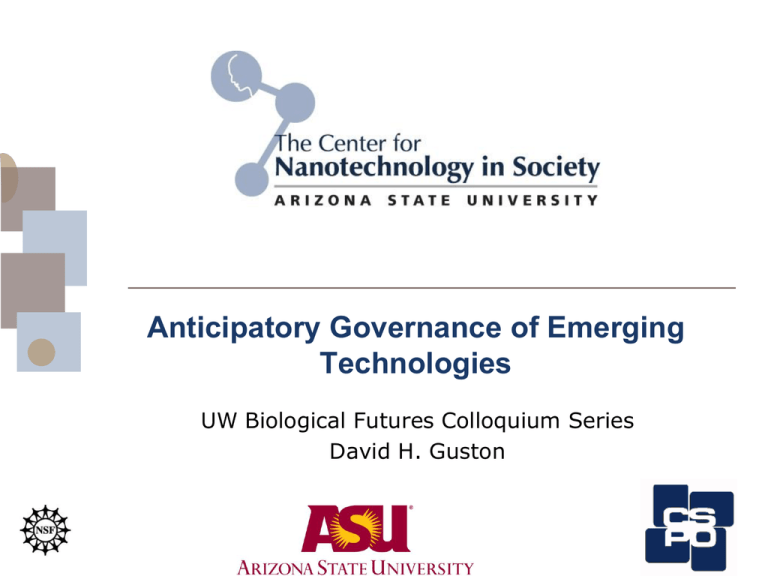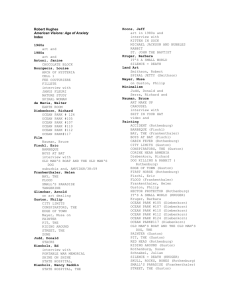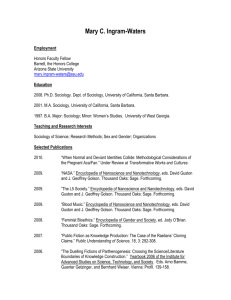Anticipatory Governance of Emerging Technologies
advertisement

Anticipatory Governance of Emerging Technologies UW Biological Futures Colloquium Series David H. Guston NSEC/Center for Nanotechnology in Society at Arizona State University • Research the societal implications of nanotechnologies • Train a community of scholars with new insight into the societal dimensions of nanoscale science & engineering (NSE) • Engage the public, policy makers, business leaders, and NSE researchers in dialogues about the goals and implications of NSE • Partner with NSE laboratories to introduce greater reflexiveness in the R&D process <David H. Guston> 2 Problem Orientation Nano-Bio-Info-Cogno Eyjafjallajokull Fukushima Katrina <David H. Guston> 3 3 Problem Orientation Nano-Bio-Info-Cogno Eyjafjallajokull Fukushima Katrina <David H. Guston> 4 4 Anticipatory Governance at CNS-ASU Anticipatory Governance Provides strategic vision 1. Foresight All governance requires a disposition toward future 2. Engagement Crucial normatively, strategically, pragmatically 3. Integration Scientists know things we don’t, and vice versa 4. Ensemble-ization Because none of these works in isolation A broad-based capacity extended through society that can act on a variety of inputs to manage emerging knowledgebased technologies while such management is still possible. Anticipate: from ante- and capere, “to take [into possession]” “beforehand”; related to capable and capacity and not a synonym for “expect,” “predict,” or “foresee” <David H. Guston> 5 5 Anticipatory Governance – Not Government • Not “do” or “ban” • “Science finds, genius invents, industry applies, man adapts” • Moratoriums proposed by ETC Group and Friends of the Earth • Wide array of mechanisms • • • • • • • • • • • • • • • • Regulation Licensing/restrictions Liability/indemnification Intellectual property R&D funding & tax credits Testing Treaties Public Understanding of Science Informal Science Education Public engagement Public action Priming Routinization Codes of conduct Standards Laboratory decisions <David H. Guston> 6 6 Anticipatory Governance – Not a New Idea, Just a New Capacity “Competent social scientists should work hand-in-hand with natural scientists, so that problems may be solved as they arise, and so that many of them may not arise in the first instance.” Detlev Bronk Pres., JHU; Pres., NAS; Pres., Rockefeller U <David H. Guston> 7 “anticipatory democracy” 7 Four Warrants for Anticipatory Governance “if we could use the tenets of psychohistory to guide ourselves we might avoid a great many troubles. But on the other hand, it might create troubles. It's impossible to tell in advance” – Isaac Asimov 1. Stop-gap: until we have prediction 2. Fail-safe: in case we can’t get prediction 3. Priority-setting: capacity to predict may not be comprehensive and doesn’t tell us how to deploy that capacity 4. Generality: prediction in some areas (nano)doesn’t imply prediction in other emerging technologies (syn bio) <David H. Guston> 8 8 I. The Puzzle <David H. Guston> 9 I.B. Two Answers Michael Polanyi “impossible and nonsensical” Frederick Soddy “duty” <David H. Guston> 10 II. Polanyi & Prediction “You can kill or mutilate the advance of science, you cannot shape it.” <David H. Guston> 11 III. Soddy & Responsibility <David H. Guston> 12 IV. Did the Dog Bark? <David H. Guston> 13 Ernest Rutherford V. The World Set Free I would become a philosopher “his greatest novel” <David H. Guston> 14 The chain reaction VI. Prediction or Plausibility? “The assessment of plausibility…is tacit.” Reliability/exactitude Systematic importance Intrinsic interest <David H. Guston> 15 VI.B. Prediction or Plausibility? If you are assembling bit of reality, is it not at this point that you want to start asking, “what happens if it is a tiger? <David H. Guston> 16 VII. Back in the Booth <David H. Guston> 17 Three Strands of Anticipation Research • Visioning • Future Artifacts and Deliberation • Plausibility <David H. Guston> 18 18 VISIONING City of St. Paul Climate Adaptation Scenarios Anticipatory Governance Visioning Workshop <David H. Guston> 19 FUTURE ARTIFACTS & DELIBERATION “MATERIAL DELIBERATION” EMERGE: SCIENTISTS AND ARTISTS IMAGINE THE FUTURES MAKING AND HACKING: EXPLORING DELIBERATIVE PRACTICES MEDIATING FUTURES Nano Education article (2010) FINDING FUTURES <David H. Guston> 20 PLAUSIBILITY International Workshop on Plausibility, Tempe, AZ (2009) CNS-ASU vodcast on Plausibility (2009) NanoFutures v.2 Survey on Plausibility Special issue: International Journal of Foresight and Innovation (call, 2011) Writing workshop, Ispra, Italy with the Joint Research Centre (2012) Technology in Society article (2010) Science and Engineering Ethics article (2011) Society for the Social Studies of Science (2010) Society for Risk Analysis panel (2010) <David H. Guston> 21 Society for the Study of Nanotechnology and Emerging Technologies (2010) Engagement • NISE Net – Nano Days – Forums • National Citizens’ Technology Forum – 2008 Nano and Human Enhancement • Science Cafes • FutureScape Tours <David H. Guston> 22 22 22 Integration • Socio-Technical Integration Research (STIR) • Responsible Innovation • Public Value • Education/Training • DC Summer Session • PhD + • Curricular <David H. Guston> 23 23 23 CNS-ASU Leadership and Staff PI: D. Guston; co-PIs C. Miller (assoc dir), D. Meldrum, D. Scheufele, J. Youtie, E. Corley Staff: R. Sanborn, M. Iafrat Assistant directors J. Wetmore, C. Selin, E. Fisher <David H. Guston> 24 24 Thanks Alison and Gwen for the invitation. National Science Foundation cooperative agreement #0531194 and 0937591. Any opinions, findings and conclusions are those of the author and do not necessarily reflect the views of the National Science Foundation. Research and programs by C. Selin, S. Davies, P. Hamlett, M. Cobb, E. Fisher, J. Wetmore, I. Bennett, M. Harsh Lee Gutkind, Daniel Sarewitz, Gregg Zachary, Erik Fisher, Peter Collins, and Heather Douglas for comments and assistance. Derrick Anderson, Gretchen Gano, and Owen Marshall for research assistance. <David H. Guston> 25


